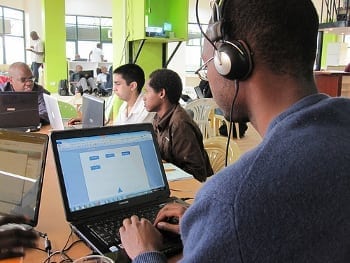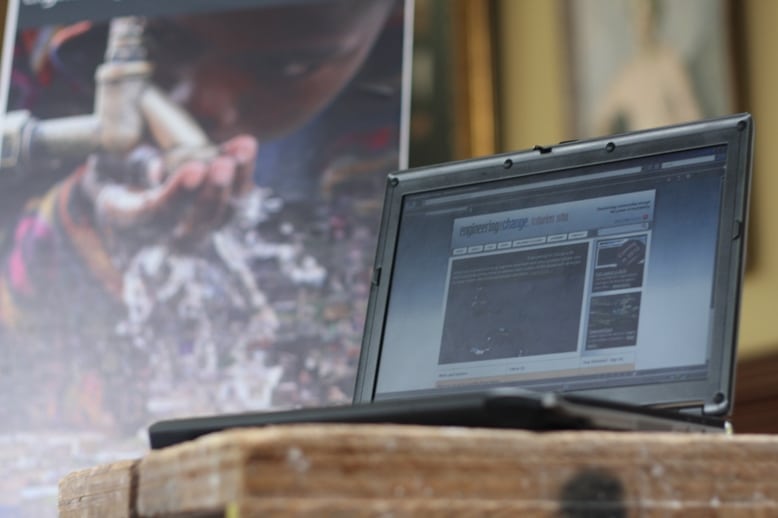
Programmers worked around the clock at Nairobi’s iHub during the Random Hacks of Kindness hack-a-thon in June 2010. Photo credit: Erik Hersman/WhiteAfrican/Flickr
When Drupal 7, the latest version of the open-source content management system, launched in January, there was at least one party in its favor in Nairobi, Kenya. The country’s programmers gathered to celebrate behind broad windows in the fourth floor of the Bishop Magua Centre, on Ngong Road, across from the Uchumi Hyper supermarket. Six months prior, a young tech community sprawled through the same offices for two days to represent Kenya in the Random Hacks of Kindness hack-a-thon. In a two-day typing frenzy, they developed mobile and web applications for search-and-rescue operations.
Since then, about 250 programmers there have created mobile apps for Kenyan farmers, mobile games and apps for international clients. These are the members of iHub, Nairobi’s first “innovation hub” for software and startup development.
“It’s the physical nexus point for the Nairobi tech community to come, share ideas, brainstorm about applications for anything they have in mind,” says iHub manager Jessica Colaço, speaking from the headquarters patio in the video embedded below. “This creates a synergy, a whole level of energy whereby we can create applications, ideas, and just get them out there to help the Kenyan economy and the Kenyan community.”
For more on what’s happening at iHub, we spoke with Colaço in Nairobi by Skype.
M-Farm
A team of three women won an award from Human IPO to launch a startup around their M-Farm app for Kenyan farmers. The app provides real-time pricing and weather information to help farmers plan and sell their products without middlemen. For the last six months, the women have trained a pilot group of farmers. They have also collected information from farmers and gathered prices at markets to post for app users.
“The farmers have been very receptive,” Colaço says. “They say this is the kind of information that they need for harvesting and for revenue.”

Jessica Colaço is photographed here at Tedx Nairobi. Photo credit: Joshua Wanyama/Wa-J/Flickr
Rupu
On International Women’s Day, March 8, a fledgling business offered travel and enterntainment deals for the ladies in Nairobi. The site is Rupu, a collective-bargaining coupon scheme similar to Groupon. It launched at the beginning of this year and the business has grown from three employees to 10.
The deals were centered in Nairobi, but now the company gets clients from surrounding areas, Colaço says. In the short time since its inception, Rupu has already partnered with other entertainment businesses.
“This shows how people within the iHub are working together to increase their customer base and add value as well,” Colaço says.
M-Payer
Ben Lyon of Kopo Kopo listed M-Payer as one of the up-and-coming players in Kenya’s mobile money sector. The app, developed at iHub, is similar to the better known M-Pesa: It performs financial transactions from a mobile device. As an aside, Lyon had high praise for such apps in Kenya. “Kenya is by far the most exciting, innovative mobile money market on earth,” he wrote on Erik Hersman’s blog, WhiteAfrican.com.
M-Order
In Nairobi, when a corner store or any retail outlet wants to restock, the manager calls on a “route boy” to take the order to the wholesaler. The process can take time and businesses can run out of stock waiting on a busy route boy. It’s an entrenched bureacratic tradition that prevents store managers from dealing directly with the wholesalers.
There may be an app that can change that, however. M-Order, now in development at iHub, may allow businesses to order stock directly online. It’s another virtual fix to speed up business in the physical world.
A growing community
“Over the last 9 months, iHub has attracted a lot of talent within Nairobi,” Colaco says. “We have been able to attract lots of young innovators.”
So far, iHub has a network of 3000 freelancers who work remotely and 250 members who work in the headquarters. There may be 50 to 60 programmers working there on any given day. Some of their current and future projects include educational games and tools to improve monitoring and evaluation and security, among others, Colaço says.
The community thrives on “open innovation,” in which people share ideas and collaborate to get results. “The whole idea of open innovation is to encourage others around you to share ideas, get them involved in your projects,” Colaço says.
For more on iHub, you can listen to Colaço’s presentation at the IEEE Humanitarian Technology Webinar in January. Check back here later, or see our YouTube channel, for the audio recording in flash format.
UPDATE 3/19: The presentation is now on our YouTube channel, and you can see it here:

